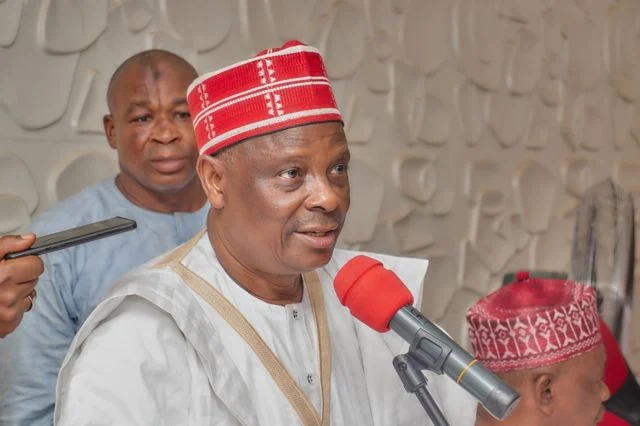The senate has approved President Muhammadu Buhari’s $22.7 billion loan request — years after it was rejected by the previous assembly.
At its plenary session on Thursday, the upper legislative chamber approved the 2016-2018 external borrowing plan which the president said would be used for critical projects across the country.
TheCable understands Nigeria’s public debt profile stands at N26.215 trillion as of September 2019.
According to a document accompanying the president’s request, the fresh loan is for about 35 projects, many of which are infrastructural.
The document which was obtained by TheCable, also shows a part of the money will be used for new projects while others will go into already existing projects.
WHERE WILL THE LOAN COME FROM?
Over 70 percent of the loan will come from the Exim Bank of China, while the remaining funds will come from the World Bank, Africa Development Bank among others.
Here are the institutions the loan is being requested:
* Exim Bank of China ($17bn)
* World Bank ($2.95bn)
* Africa Development Bank ($1.88bn)
* Islamic Development Bank ($110m)
* Japan International Cooperation Agency ($200m).
* German Development Bank ($20m)
* French Development Agency ($480m
THE SPENDING PLAN
Here is how the Buhari administration plans to spend the loan and where the projects are located as contained in the document:
INFRASTRUCTURE
– Emergency road rehabilitation and maintenance ($434.7m, nationwide)
– Abidjan-Lagos corridor highway development project study ($1.5m; multinational) – Abuja mass rail transit project (phase 2) ($1.25bn; FCT)
– East-west road ($800m; Niger Delta)
– Nigeria Housing Finance Project Guarantee Scheme ($100m; national)
– Lagos-Kano railway modernisation project (Ibadan-Kano segment double track) ($5.53bn; Ibadan-Kano states)
– Railway modernisation coastal railway project (Calabar-Port Harcourt-Onne deep sea port segment ($3.47bn; Cross River and Rivers states)
SOCIAL INVESTMENT
– National Social Safety Net Project ($500m, nationwide)
– Multi-sectoral crises recovery programme ($200m, north-east)
– North-east Nigeria integrated social protection, basic health, education, nutrition services and livelihood restoration project ($100m; north-east)
POWER
– Power transmission project ($200m; Lagos, Ogun)
– Vocational training in power sector ($50m; FCT, Lagos, Ogun. Kano, Plateau, Niger, Enugu, Kaduna and Cross River)
– TCN overall transportation system enhancement project ($200m; nationwide)
– Mambila hydro-electric power project ($4.8bn; Taraba)
– Nigeria Electricity Transmission and Access Project ($364m; nationwide)
EDUCATION
– Better Education Service Delivery for All (BESDA) ($500m, nationwide)
ECONOMY
– Development finance project ($500m, nationwide)
– Kaduna state economic transformation program for results ($35m, Kaduna)
– Development finance project (2) ($450m, min. of power)
– Development finance project (3) ($20m, nationwide)
– MSMEs project ($1.28bn; nationwide)
COMMUNICATION
– NTA digitisation project ($500m; nationwide)
– National Information and Communication Technology Infrastructural Backbone Project (NICTIB) phase II ($328.1m; Lagos, Abuja, Ibadan, Akure, Maiduguri, Lokoja, Kaduna, Akwanga, Bauchi, Kano, Katsina)
AGRICULTURE
– Staple crops processing zone support project ($100m, Kogi)
– Agriculture Transformation Agenda Support Project II (ATASP) ($200m, nationwide)
– Staple crops processing zone projects (2) (500m; nationwide)
HEALTH/WATER
– Regional disease surveillance systems enhancement project in West Africa ($90m, nationwide)
– Health System Project ($110m, Katsina)
– Rural water supply and sanitation ($150m; north-east, and Plateau)
– Greater Abuja water supply project ($381m; FCT)
GOVERNANCE
– Fiscal Governance and Institutions Project (FGIP) ($200m, government institutions)
– Institutional strengthening and implementation of policy reforms ($33.7m, min. of works and housing)
ENVIRONMENT
– Lake Chad Basin Commission ($13m, multinational)
– Integrated programme for development and adaption to climate change in the Niger Basin ($6m; Nigeria and Niger)
– Development of the mining industry ($150m, nationwide)

 BIG STORY4 days ago
BIG STORY4 days ago
 BIG STORY4 days ago
BIG STORY4 days ago
 BIG STORY5 days ago
BIG STORY5 days ago
 BIG STORY2 days ago
BIG STORY2 days ago
 BIG STORY1 day ago
BIG STORY1 day ago
 BIG STORY4 days ago
BIG STORY4 days ago
 BIG STORY4 days ago
BIG STORY4 days ago
 BIG STORY4 days ago
BIG STORY4 days ago


























